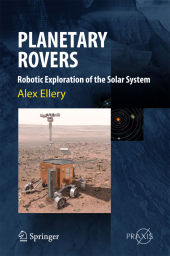 Neuerscheinungen 2016Stand: 2020-02-01 |
Schnellsuche
ISBN/Stichwort/Autor
|
Herderstraße 10
10625 Berlin
Tel.: 030 315 714 16
Fax 030 315 714 14
info@buchspektrum.de |

Alex Ellery
Planetary Rovers
Robotic Exploration of the Solar System
1st ed. 2016. XXIX, 702 S. 36 SW-Abb., 119 Farbabb. 242 mm
Verlag/Jahr: SPRINGER, BERLIN 2016
ISBN: 3-642-03258-3 (3642032583)
Neue ISBN: 978-3-642-03258-5 (9783642032585)
Preis und Lieferzeit: Bitte klicken
With the recent declarations of intent by spacefaring nations to return to the Moon and to send sample return missions to Mars, this self-contained and comprehensive book will be most timely. It will include a case study - the ExoMars Rover - to which both authors have contributed for the European Space Agency. The highly successful US Mars Exploration Rover programme, in which Lutz Richter was involved, will also be covered.
To the authors´ knowledge, this unique book will be the only one that covers the space, automotive and robotics technologies specifically geared to the development and design of planetary rovers and the associated problems of locomotion and navigation.
The book will open with an introduction to the use of robotic rovers for planetary exploration and their relationship to other terrestrial applications, including oceanography. The terrain in particular, in planetary environment, is a major design driver for the planetary rover and therefore a review of each planet and small bodies of the solar system and their impact on rover design is provided. Mars is the best known example for the NASA follow the water strategy in astrobiology research and is the most likely planet to be explored in the near term.
Planetary missions are designed with a different engineering philosophy than Earth-orbiting missions. There are great uncertainties about the operational environment, new scientific instruments, and the requirement for new spacecraft and robotic technologies to make them economically feasible. These include rover design, locomotion, autonomous navigation, rover avionics, mission communications architecture and power generation and thermal control. The authors conclude by speculating on the need for the manned astrobiological investigation of Mars in terms of near-term evolution of robotic terminology and how robotic rovers can support manned mission by relieving the astronaut/cosmonaut workload.
In addition, the future of robotic astrobiology missions will be explored with the implementation of biomimetic robots which attempt to utilise biological solutions to engineering problems. Finally, Nanotechnology and its limitations in the miniaturisation of actuation systems will be covered.
"It aims to be a complete overview of the design, implementation and control of planetary rovers, ranging widely from details of past rovers, through overviews of algorithm research into the process of bidding and managing projects for the European Space Agency (ESA). ... it targets a wide audience from final year undergraduates to industry engineers involved with rover development - anyone involved in rover design. ... I would recommend this book to anyone working or interested in the field ... ." (Dr. Iain Wallace, The Aeronautical Journal, January, 2017)
Professor Alex Ellery is a Canada Research Chair in Space Robotics & Space Technology in the Mechanical & Aerospace Engineering Department at Carleton University, Ottawa, Canada. He holds a BSc (Hons) in Physics, MSc in Astronomy and PhD in Astronautics & Space Engineering. He is also an alumnus of the International Space University. He is a Chartered Engineer and holds Fellowships at the Institution of Engineering & Technology, Institution of Mechanical Engineers, and the Royal Aeronautical Society. He was formerly at the Surrey Space Centre at the University of Surrey where he was awarded the George Stephenson medal by the Institution of Mechanical Engineers (2005). He was formerly Chair of the Astrobiology Society of Britain (2005/2006).


